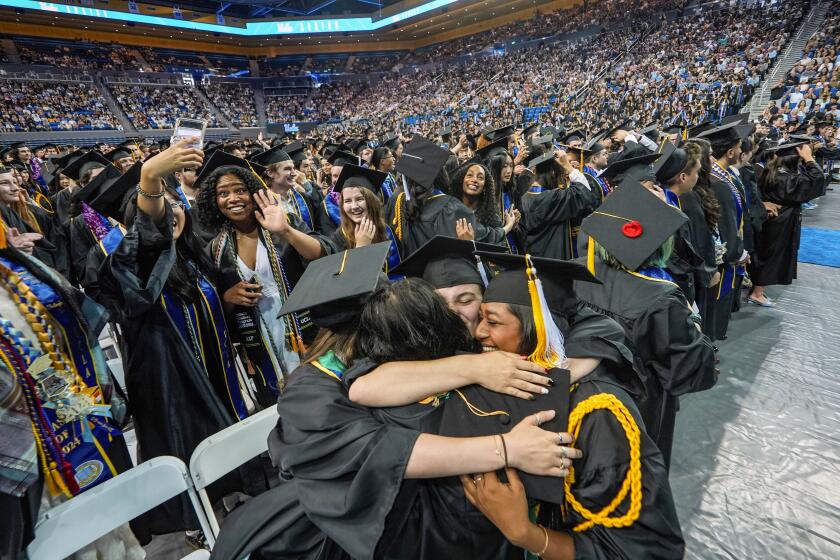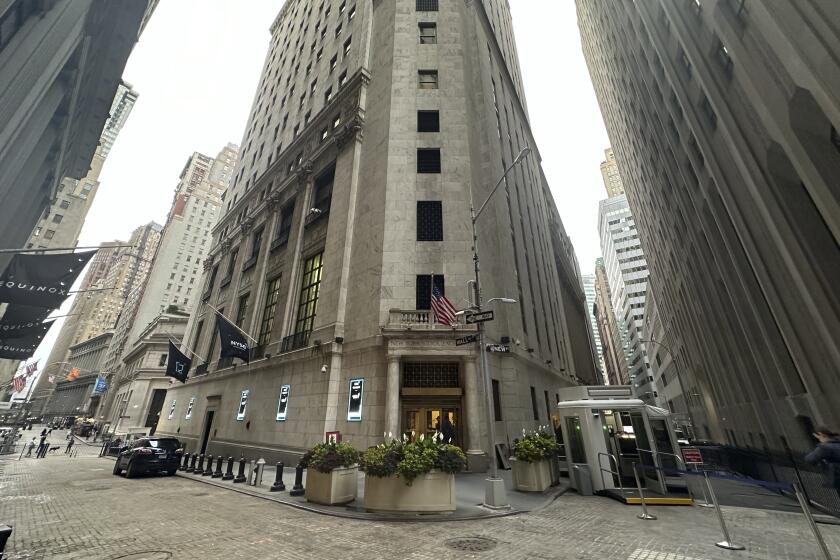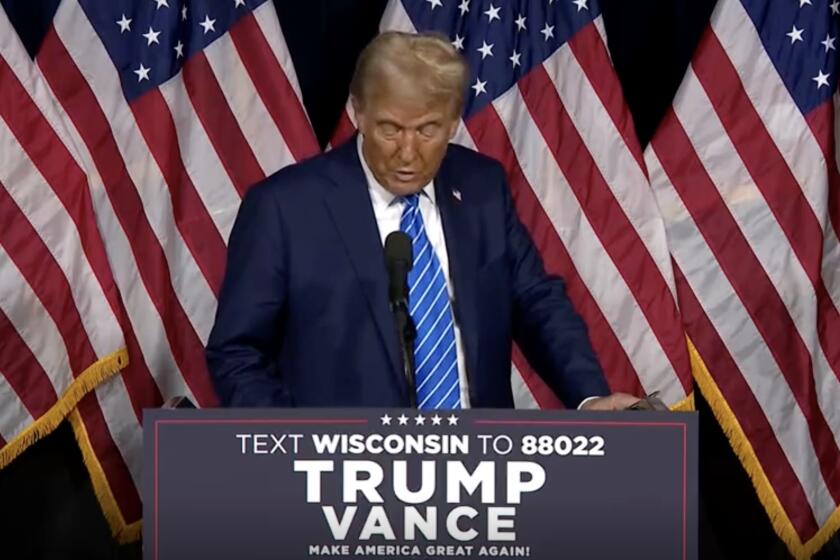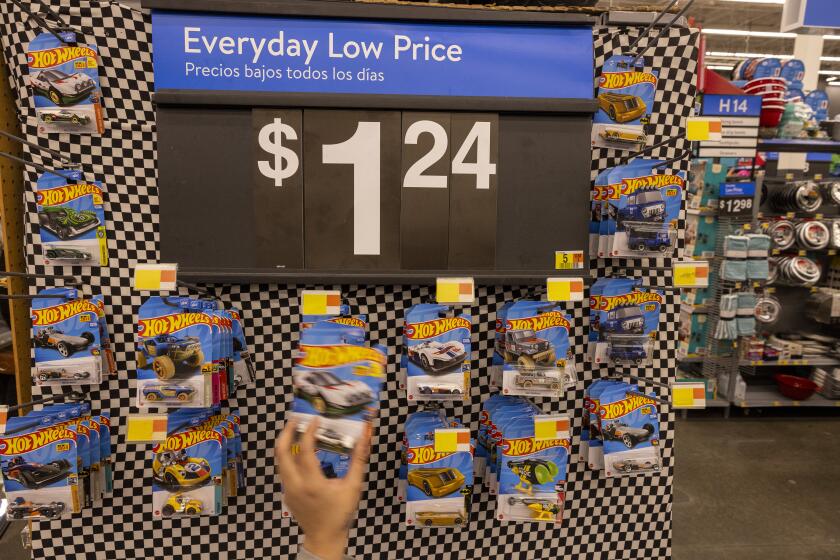Bush Brother Was a Consultant to Company Under Scrutiny in Japan : Finance: Prescott Bush gave investment advice to a firm lately suspected of gangland ties and of exchange violations, police investigators say.
Police investigators following the serpentine money trails of a company strongly suspected of being tied to a major Japanese yakuza (gangster) group have stumbled across a surprising American connection.
The police discovered that Prescott Bush, the older brother of President Bush, was working as a consultant to West Tsusho, a Tokyo-based investment company police believe is backed by one of Japan’s most powerful underworld figures and which they are investigating for possible violation of foreign exchange laws.
The foreign exchange law violations are related to West Tsusho’s investments in two American companies, Quantum Access, a Houston-based software development company, and Asset Management International Finance and Settlement, a company in which Prescott Bush was a senior adviser until resigning the position last year.
According to documents filed with the U.S. Securities and Exchange Commission, Bush recommended the two companies to West Tsusho as investments and was paid a $250,000 commission by West Tsusho for his services in connection with the Asset Management acquisition. Bush also guaranteed some of West Tsusho’s investments, according to the SEC documents.
Attempts to reach the President’s 68-year-old brother at his Connecticut home and to reach Quantum Access were unsuccessful.
Stanley Scheinman, an executive with New York-based Asset Management, said he was unaware of any relationship between Japanese gangsters and West Tsusho, which he said owns a controlling interest in Asset Management.
In a separate statement Monday, Asset Management’s chairman, Albert B. Shepard, said the company is suing West Tsusho and various affiliates and officials over a $530,000 loan that has not been repaid. He also said that the company was unaware of any possible link between the Japanese investors and the gangsters.
More than a year ago, Scheinman said in an interview that Prescott Bush was instrumental in introducing officials of Asset Management to West Tsusho, which has invested $7 million in the New York firm. Asset Management provides financial and trade services, primarily in Asia.
According to reports in the Japanese media, West Tsusho, formerly a company that cleaned ships’ bilges, is an arm of Hokusho Sangyo, a real estate and investment company, and is believed to have received a substantial portion of its investment money from that firm. Hokusho Sangyo, also according to the media reports, is controlled by Susumu Ishii, who was chairman of the Inagawakai, Japan’s second-largest crime syndicate, until he resigned in October.
The White House refused to comment on the activities of the President’s brother. “We don’t have any knowledge of his activities and won’t have any comment on it,” Press Secretary Marlin Fitzwater said at a briefing Friday.
The older Bush has been criticized in the past for taking advantage of his relationship with the President to carve out prominent roles in investment deals around the world, including a just-completed resort project in China with Japanese construction giant Aoki Corp.
West Tsusho’s alleged yakuza connection has only recently come to light, and observers say that Bush is consequently unlikely to have been aware of any ties when he was first introduced to the company’s president, Sanpei Koyanagi, in 1989. Police have given no indication that Bush is suspected of any illegal activities.
Still, Bush’s role as go-between may have unwittingly given a big boost to the 8,200-member Inagawakai crime organization, which is believed to be West Tsusho’s key financial backer.
“Being connected to the President’s family increases the gang’s (Inagawakai’s) prestige,” says Takura Suzuki, an expert and frequent commentator on yakuza. “It looks to everybody like they have connections in high places. It makes it easier for them to make future investments.”
Police raided Hokusho Sangyo on May 25 and followed up with a raid on Ishii’s home on May 30 to gather documents related to Tsusho’s American investments. “It seems pretty clear there is a connection (between West Tsusho and Ishii),” said a spokesman for the Hyogo prefectural police. “We are now looking at the documents to see what is going on.”
The Hyogo police are heading the investigation because bank checks that West Tsusho used to make what the police call illegal investments in South Korean property first showed up in that southeastern district, which includes the city of Osaka. Follow-up investigations of West Tsusho turned up the company’s American investments and the Bush connection, according to press reports.
Hokusho recently moved its headquarters to an undisclosed location, and no representatives could be reached for comment. A man answering the phone at West Tsusho said he was not a company employee and that no one was available for comment.
Japan’s leading yakuza figures are well known to the public and closely monitored by the police. Although the gangsters control large prostitution and drug rings and engage in various forms of extortion, police have in the past tolerated their activities because the orderly and highly ritualized crime syndicates seldom bothered the general public and were relatively easy to control.
The police, however, have recently become concerned over violent territorial battles between the gangs and the increasing tendency of yakuza to get involved in the high-finance world of stock manipulation and foreign investment. A new law was passed this spring to make it easier for police to control gangster business activities.
While Prescott Bush may not have been aware of West Tsusho’s shadowy background, he has apparently benefited from the relationship. The Japanese press has reported that Bush received a substantial commission in 1989 for helping Tsusho purchase 1 million shares of Quantum Access, the Houston-based company, for between $3 million and $4 million.
The same year, Bush arranged for Tsusho to pay $5 million for a 40% share of Asset Management International Financing and Settlement, a financial firm at which Bush was acting as senior adviser and in which he owned shares. Tsusho bought most of the remaining shares of Asset Management a year later for $2 million. Police believe that the money came from Ishii by way of Hokusho, according to press reports.
Notes attached to consolidated financial statements from the Asset Management company show Prescott Bush and Company, a firm owned by the President’s brother, received a finder’s fee of $250,000 for arranging the Asset Management acquisition, according to the Securities and Exchange Commission.
In a separate contract filed with the SEC, Prescott Bush and his company jointly guaranteed that if at the end of five years the Japanese investors were not able to recoup $2.5 million of their investment through the sale of a portion of Asset Management’s shares, Bush would cover the difference.
The reason given for the police raid on Hokusho and Ishii was to examine whether West Tsusho violated the law in failing to report to the Japanese Finance Ministry its investments in Asset Management and Quantum Access.
But this and related investigations have uncovered deals even more disturbing to authorities. Ishii, the former gang boss, appears to have created a powerful network reaching into the highest levels of Japan’s financial establishment.
Finance Ministry officials, for example, have expressed alarm over indications that in 1989, Ishii borrowed as much as $250 million from a group of 12 firms including credit companies affiliated with Nomura Securities Co. and Nikko Securities Co., using memberships in a golf course Ishii owns as collateral. Ishii reportedly used the money to buy shares of Tokyu Corp., a railroad conglomerate.
One of Ishii’s 12 backers was Aoki Corp., a major construction company that has also had direct dealings with Prescott Bush. Aoki Corp. worked with Bush and a Chinese government organization on an $18-million project to build the Shanghai Country Club, a resort complete with golf course and tennis courts that opened last month. Bush will receive 25% of all the profits from the project in exchange for his role in planning the project, according to Tsutomu Nakano, a spokesman for Aoki Corp.
BACKGROUND
Prescott Bush is an international businessman with extensive contacts in Asia and has been known to visit Far East capitals shortly in advance of his more famous brother’s official trips. In the fall of 1989, he made a business swing through Asia and spent a weekend in Beijing. “There’s no conflict of interest,” he told the Wall Street Journal at the time. Then he added: “It doesn’t hurt that my brother is the President of the United States.”
More to Read
Inside the business of entertainment
The Wide Shot brings you news, analysis and insights on everything from streaming wars to production — and what it all means for the future.
You may occasionally receive promotional content from the Los Angeles Times.










